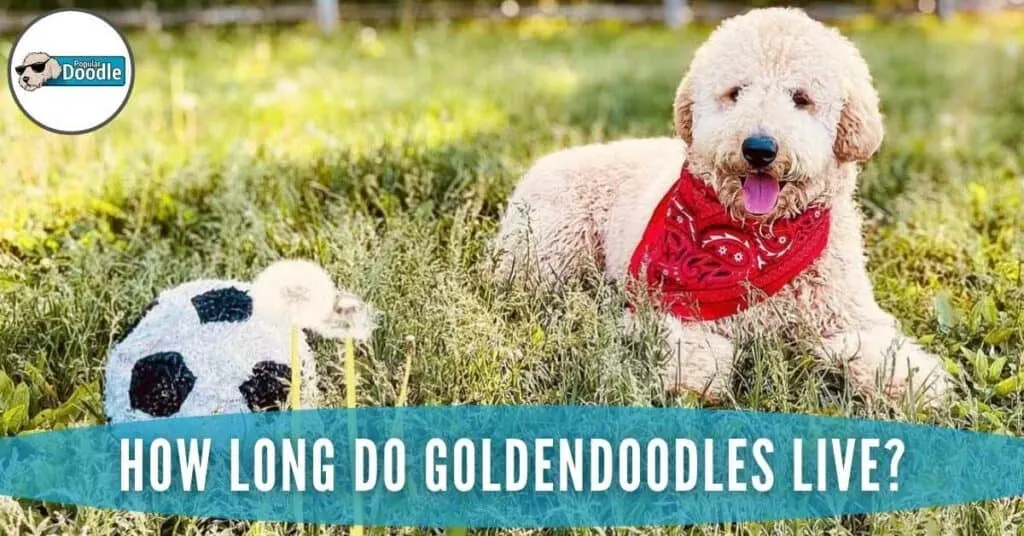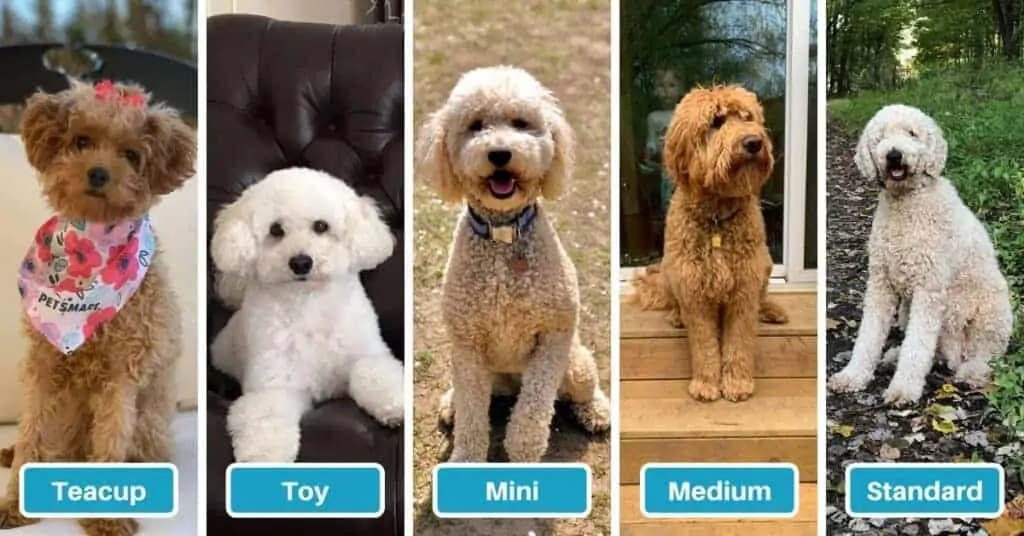
As a current or future Goldendoodle owner, it’s only natural to wonder, “how long do Goldendoodles live?”
Although it can be sad to think about losing our fluffy best friend, knowing the average life expectancy of a Goldendoodle can be important. This information helps us know how to best care for our dog all the way from puppyhood to their senior years.
So, how long do Goldendoodles live? The average lifespan of a Goldendoodle is 12.5 years. This average can skew higher or lower depending on factors such as the size of your Goldendoodle, what generation they are, and their health status.
Toy (or Teacup) Goldendoodles will live the longest, averaging between 13-16 years. The average life expectancy of Mini Goldendoodles is 12-15 years. Standard Goldendoodles usually live the shortest, with an average lifespan between 10-13 years.
| Size | Estimated Lifespan |
|---|---|
| Teacup / Toy Goldendoodle | 13-16 Years |
| Mini Goldendoodle | 12-15 Years |
| Standard Goldendoodle | 10-13 Years |
Keep reading to learn what factors skew your dog’s life expectancy higher or lower. In addition, we’ll show you simple changes you can make so your pup can “beat the odds” and live a long, healthy life!
What Impacts Your Goldendoodle’s Life Expectancy?
While it’s impossible to know with certainty how long a particular Goldendoodle will live, we can create a rough estimate based on a handful of factors…
Size

Assuming that your Goldendoodle doesn’t have a major accident or illness, how big they are is the single most important indicator of how long they will live. As a rule of thumb, the smaller your Goldendoodle is in size, the longer they will live.
This correlation between size and life expectancy occurs because larger dogs have more strain on their physiological processes which causes them to age faster.
All other factors being equal, the average mini Goldendoodle will live two years longer than the average standard Goldendoodle. The average toy Goldendoodle will live one year longer than the average mini Goldendoodle.
Read More: Goldendoodle Size Full Grown: How Big Do Goldendoodles Get? (Teacup, Toy, Mini, Medium, Standard)
Generation

Goldendoodles are a cross between two breeds with distinctly different lifespans. Poodles average a 12-15 lifespan (combining all sizes) while the Golden Retriever only lives for 10-12 years.
This is primarily due to their size difference as well as some prevalent health issues in the Golden Retriever such as cancer.
Read More: Goldendoodle Health Issues: 10 Common Goldendoodle Health Problems to Look Out For!
There are two competing schools of thought when it comes to how Goldendoodle generations affect lifespan.
Some believe that the closer in DNA your Goldendoodle is to the longer-living Poodle, the better. Others believe that the additional “hybrid vigor” of having the 50/50 split in DNA of an F1 Goldendoodle will positively influence lifespan.
While there are merits and drawbacks to each of those arguments, at the end of the day, generation will only play a small role in lifespan one way or the other. Goldendoodle generations are important for other aspects such as allergy-friendliness and shedding, but you should prioritize other factors when it comes to life expectancy.
Read More: Goldendoodle Generations Explained (F1, F1B, F1BB, F2, F2B, F2BB, F3, Multigen)
Hereditary Influences
Like human children inherit traits such as eye color or height from their parents, Goldendoodle puppies will also inherit traits from each of their parents.
On the positive side, this allows breeders to produce puppies with beautiful, intricate coat patterns like Parti Goldendoodles or Phantom Goldendoodles.
On the negative side, these inherited traits sometimes can result in genetic health issues. That’s why responsible breeders will always perform extensive genetic testing before breeding two dogs.
As an extra precaution, many Goldendoodle owners choose to invest in a DNA + Health Kit from Embark. You can do this simple cheek-swab test with your dog at home and mail it back to get your results.
The information from this test allows you to see which health issues your Goldendoodle is susceptible to over their lifetime. Then you can work with your veterinarian to prevent these issues or, at minimum, keep an eye out for them so treatment can start ASAP.
As a bonus, if you adopted your Goldendoodle from a rescue, it can confirm their breed and even find their doggy relatives!
Health Concerns
While Goldendoodles are generally considered a healthy breed, all dogs are susceptible to various accidents and illnesses that can affect life expectancy.
Some potential health concerns in Goldendoodles include cancer, Von Willebrand’s disease, hip displasia, bloat, and ear infections among other issues.
If you don’t have it already, consider enrolling your Goldendoodle in pet insurance. Many common health issues in dogs are expensive to treat. Pet insurance can cover up to 90% of your vet bills, ensuring you’ll never have to base your dog’s medical care on what you can afford.
Comparing Goldendoodle Age vs Human Age
Contrary to the commonly believed myth, 1 human year is not necessarily equal to 7 dog years. The true ratio of how old your dog is in human years depends on their size and breed.
The table below will give you an idea of how old your Goldendoodle is in human years based on weight data from each size of Goldendoodle. It’s only a ballpark estimate, but it’s a fun way to compare your dog’s age to your own!
| Size | Toy / Teacup Goldendoodle | Mini Goldendoodle | Standard Goldendoodle |
|---|---|---|---|
| Dog Age | Age in Human Years | Age in Human Years | Age in Human Years |
| 1 | 15 | 15 | 15 |
| 2 | 24 | 24 | 24 |
| 3 | 28 | 28 | 28 |
| 4 | 32 | 32 | 32 |
| 5 | 36 | 36 | 36 |
| 6 | 40 | 42 | 45 |
| 7 | 44 | 47 | 50 |
| 8 | 48 | 51 | 55 |
| 9 | 52 | 56 | 61 |
| 10 | 56 | 60 | 66 |
| 11 | 60 | 65 | 72 |
| 12 | 64 | 69 | 77 |
| 13 | 68 | 74 | 82 |
| 14 | 72 | 78 | 88 |
| 15 | 76 | 83 | 93 |
| 16 | 80 | 87 | 99 |
Using the table above, you’ll get a better understanding of where your Goldendoodle is in their life cycle. As you can see, the ages they become an adult and senior differ primarily depending on size.
Common Signs of Aging in Dogs
Greater Number of Health Problems
As your Goldendoodle ages and becomes a senior, you’ll want to be on the lookout for additional health issues.
These can be physical ailments like joint issues or cataracts. There can also be mental symptoms of cognitive decline such as slower response times and decreased desire to do everyday activities.
Some health issues can be minor while others can be life-threatening. Keeping in contact with your veterinarian is the best way to learn what behaviors are normal for an older Goldendoodle and what could be signs of underlying health concerns.
Have a question for a vet? Click here to live chat instantly with a verified veterinarian!
Lower Energy
Just like when they were puppies, older Goldendoodles will need additional sleep to rest and recover from each day. This is completely normal!
However, sometimes sleeping too little or too much are concerning signs that could indicate health problems. For more information on this, our veterinarian answered your most pressing questions about Goldendoodle sleeping habits!
Reduction in Senses
Just like what happens to humans in old age, you may notice your Goldendoodle having trouble seeing, hearing, or smelling.
Always keep your veterinarian in the loop when you notice these changes. In addition, you can make some simple accommodations to help your dog adjust.
Having a predictable, steady routine makes your senior Goldendoodle more comfortable. In addition, giving them an audible or visual warning before you pet them can help you avoid startling them.
Weight Gain or Loss
Weight management is critically important in all stages of your Goldendoodle’s life. Feeding a healthy diet and making sure your Goldendoodle is getting the right amount of exercise are musts for all owners.
Related: Goldendoodle Exercise Needs by Age & Size
As your pet ages, they may be more prone to losing or gaining weight. You’ll want to monitor this so you and your veterinarian can make sure it doesn’t reach unhealthy levels one way or the other.
Have a question for a vet? Click here to live chat instantly with a verified veterinarian!
Reduced Bladder Control
Goldendoodles in their golden years often struggle with bladder control. Patience is key here, as your dog is likely already stressed since they know accidents in the house are “breaking the rules.”
You’ll likely have to make some accommodations for your senior Goldendoodle’s bathroom habits. Making sure you take your dog outside for more frequent bathroom breaks is important.
If you can’t come home during the day, investing in indoor potty pads is a good idea. Hiring a dog walker or dog sitter using a site like Rover.com can also help!

How to Extend the Lifespan of Your Goldendoodle
Get Pet Insurance as Early as Possible
So many owners are forced to compromise their dog’s medical care based on what they can afford. Sadly, this is why over 500,000 pets are euthanized each year…because the life-saving care necessary was too expensive.
Enrolling your Goldendoodle in a pet insurance policy is the best way to prevent situations like this from occurring. They can cover up to 90% of your dog’s medical expenses for accidents and illnesses. Contrary to what some “gurus” suggest, having a savings account is NOT a substitute for pet insurance.
I recommend comparing plans and prices to see what’s the best fit for your dog. Healthy Paws and Embrace are two options that many Goldendoodle owners swear by.
Weight Management
Keeping your dog at a healthy weight may be the simplest thing you can do to increase your Goldendoodle’s lifespan.
Just because it’s simple doesn’t mean it’s easy though…just ask any human attempting to lose weight! If your Goldendoodle is overweight or underweight, work closely with your veterinarian to come up with a healthy weight management plan.
Your Goldendoodle getting older isn’t an excuse to let them gain weight. If anything, it should be more motivation to keep them healthy!
Keep Track of Your Dog
One of the biggest reasons pets die early is getting lost. The statistics don’t lie…and they’re scary!
1 in 3 pets will go missing at some point in their life. If that happens to your Goldendoodle, the odds of them coming back home alive are lower than 25%.
More and more doodle owners are investing in GPS tracking collars for their dog. Personally, I use the Fi Smart Collar. It not only allows you to track your dog’s location in real-time, but it keeps tabs on their activity levels in the same way a FitBit or a smart watch would do for humans!
To demonstrate how effective this collar is, I created an experiment where I “lost” my Goldendoodle to see if I could find him with and without using the Fi collar. Click here to see the full video and experiment results!

Fi GPS Smart Collar for Dogs
Use the promo code POPULARDOODLE25 to get $25 off your new Fi collar!
Prioritize Oral Hygiene
Oral hygiene is easily the most forgotten aspect of canine health. Most dog owners have probably never had their pup’s teeth brushed!
There’s never been a better time to start a regular oral hygiene routine with your Goldendoodle than today! Simple habits like giving your dog the occasional dental treat and brushing their teeth regularly can make a world of difference in fending off numerous health issues!
Visit Your Veterinarian for Regular Checkups
Checkups with your veterinarian can sometimes seem like you’re throwing money down the drain if your Goldendoodle has been healthy. However, that’s definitely not the case!
Not only does this give you the opportunity to keep your pup’s vaccines up to date, but these visits help your veterinarian catch potential health issues early on before they affect your dog’s quality of life or become bigger problems.
This proactive approach can not only save you money in the long run, it can sometimes make the difference between the life and death of your Goldendoodle!
Have a question for a vet? Click here to live chat instantly with a verified veterinarian!







![What is a Sable Goldendoodle? [Photo Gallery & FAQs] what-is-a-sable-goldendoodle](https://populardoodle.com/wp-content/uploads/2021/11/what-is-a-sable-goldendoodle-1024x536.jpg.webp)

